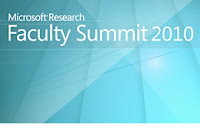2010-07-17: Microsoft Research Faculty Summit 2010
 On July 12-13 2010 I was at the Microsoft Research Faculty Summit 2010 in Redmond WA. The agenda was exciting and one of the few conferences that where I've had real difficulty in choosing which of the parallel session to attend.
On July 12-13 2010 I was at the Microsoft Research Faculty Summit 2010 in Redmond WA. The agenda was exciting and one of the few conferences that where I've had real difficulty in choosing which of the parallel session to attend.The first keynote was about Kinect for Xbox 360. The demos were very impressive and I had no idea that motion capture was ready for the home market. Check out the trailer at the MS site.
The next session I attended was about the "Bing Dialog Model". I must confess that I'm unconvinced on how different Bing is from Google. Here's a side-by-side comparison of each search engine on the query "Michael Nelson":
They seem nearly identical to me: the tri-panel layout (controls on left, content in center, ads on right), the link layout/colors (blue title, black summary, green URI), interspersed images, tabs at the top, etc. The extended summary Bing gives you when you mouse over a link region is nice, and some of the details are different, but this is basically the same interface. They did demonstrate some summarize content (e.g., current and comparative status in sports box scores), but I can't help but feel that this is propagating anonymous (e.g., not bookmarkable) Web resources. The "Los Links" commercials are funny (episode 1 & episode 2), but I can't help but feeling they are addressing a problem I don't think I have. I also realize that given my knowledge of the tools, my search behavior and strategies have likely adapted (cf. Sapir-Whorf).
Next up was me during a lunchtime brown bag seminar chaired by Lee Dirks where I gave a well-attended talk about Memento:
I was a bit worried about how much detail to include, but I think I found the right level. There were a lot of good questions and discussion afterward, including a discussion with Alex Wade's summer intern, Kevin Lane, that extended through the next two sessions. The next session had a nice presentation from Tara McPherson about the journal "Vectors" and its follow-on "Scalar". The closing keynote was from Turing Award winner Chuck Thacker about FPGAs. Not being an architecture person the talk went over my head, but you don't pass up opportunities to catch a lecture from someone like Chuck.
The second day opened with a prestigious panel about transforming CS research. Rather than summarize it, I recommend you read it. Next was DemoFest, where you could play with Kinect. Over lunch I discussed possible Memento & Zoetrope integration with Eytan Adar. The next session featured an exciting presentation from Walter Alvarez about "Big History" and the ChronoZoom interface -- very exciting stuff. That session ended with a presentation about WorldWide Telescope, which was impressive but suffered for being scheduled after Walter. The closing keynote was about the making of Avatar (some of the concepts can be found in videos from Sequence Mag and Wired).
More notes can found with the hash tag "#facsumm".
This was an excellent conference and I was very happy to have the opportunity to speak about Memento. Thanks to Alex and Lee for the invitation.
--Michael


Comments
Post a Comment